 Petzlover
Petzlover Bernese Mountain Dog is originated from Switzerland but Belgian Shepherd Dog (Tervuren) is originated from Belgium. Both Bernese Mountain Dog and Belgian Shepherd Dog (Tervuren) are having almost same height. Bernese Mountain Dog may weigh 21 kg / 47 pounds more than Belgian Shepherd Dog (Tervuren). Bernese Mountain Dog may live 4 years less than Belgian Shepherd Dog (Tervuren). Bernese Mountain Dog may have more litter size than Belgian Shepherd Dog (Tervuren). Both Bernese Mountain Dog and Belgian Shepherd Dog (Tervuren) requires Moderate Maintenance.
Bernese Mountain Dog is originated from Switzerland but Belgian Shepherd Dog (Tervuren) is originated from Belgium. Both Bernese Mountain Dog and Belgian Shepherd Dog (Tervuren) are having almost same height. Bernese Mountain Dog may weigh 21 kg / 47 pounds more than Belgian Shepherd Dog (Tervuren). Bernese Mountain Dog may live 4 years less than Belgian Shepherd Dog (Tervuren). Bernese Mountain Dog may have more litter size than Belgian Shepherd Dog (Tervuren). Both Bernese Mountain Dog and Belgian Shepherd Dog (Tervuren) requires Moderate Maintenance.
 The Bernese Mountain Dog comes from the Swiss Alps and is one of four separate breeds called Sennenhund or “Alpine pasture dog”. The Name Bernese Mountain Dog indicates the area of Switzerland that the dogs come from – the canton of Bern. These groups of dogs accompanied the dairymen and herders and they were farm dogs. They pulled carts, delivered goods from village to village. The Bernese Mountain Dog was part of this group along with: Greater Swiss Mountain Dog, Appenzeller,Entlebucher Mountain Dog and the Bernese Mountain Dog. It is probably true that the Bernese Mountain Dog has been a part of farm life in the Alps for over 2000 years.
The Bernese Mountain Dog comes from the Swiss Alps and is one of four separate breeds called Sennenhund or “Alpine pasture dog”. The Name Bernese Mountain Dog indicates the area of Switzerland that the dogs come from – the canton of Bern. These groups of dogs accompanied the dairymen and herders and they were farm dogs. They pulled carts, delivered goods from village to village. The Bernese Mountain Dog was part of this group along with: Greater Swiss Mountain Dog, Appenzeller,Entlebucher Mountain Dog and the Bernese Mountain Dog. It is probably true that the Bernese Mountain Dog has been a part of farm life in the Alps for over 2000 years.
In some regions of the Alps, these dogs were called Durrbachhund after a small town named Durrbah and are said to be rooted in the Molosser breeds. Tin 1902 the Swiss Kennel Club recognized the Bernese Mountain Dog as a separate breed and the first breed club was founded in 1907 in the region of Burgdorf. The first standard for the breed was written and separated the 4 dogs into their own breeds. The Molosser is an ancient breed whose versatility and travels made it expressly influential in the developing of Mastiff dogs like St. Bernards, Great Pyranees, Mastiffs and Swiss Mountain Dogs like the Bernese.
However at the end of the 19th century famers and shepherds began to import other breeds of working dogs, while at the same time automated modes of transportation began to replace the farm dogs. Under these circumstances the number of Bernese Mountain Dog began to decline and the breed faced potential extinction. A group of people were gathered together to save the Berner, including Franz Schertenleib and Albert Heim. Still today the Bernese are in short supply and because of the need and desire to increase the numbers, some breeding practices have not been as good as they should have been. However, today’s Berner is a great family dog and he still loves to work. He is good at carting, herding, search and rescue, watch dog, tracking, and competitive obedience.
The Bernese Mountain Dog came to the US after World War I and was imported to Britain in the 1930’s. The AKC accepted the Berner as a new Working-Class breed in 1937. It was not until 1968 that the Bernese Mountain Dog Club of America was formed. In 1981, the AKC accepted the club as a member and in 1990 they (AKC) adopted the standard used today to judge the Bernese Mountain Dog.
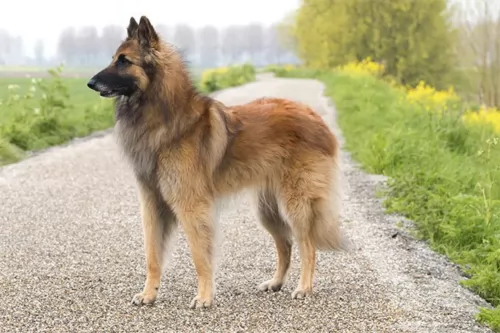 Referred to as the ‘Terv’, this dog from Belguim was created in the late 19th century. He is one of 4 varieties of Belgian Shepherd and he has a long, fawn colored coat. It was in 1892 that the first show for Belgian Shepherds took place and it was the Tervuren variety that won.
Referred to as the ‘Terv’, this dog from Belguim was created in the late 19th century. He is one of 4 varieties of Belgian Shepherd and he has a long, fawn colored coat. It was in 1892 that the first show for Belgian Shepherds took place and it was the Tervuren variety that won.
Breeders of these dogs gave each of the four varieties their own name, and the name Tervuren comes from a Belguim village. This is where M.F. Corbeel bred dogs, believed to be the foundation of the Tervuren breed.
In World War I, many of these dogs were used by the military for war related jobs. Some of these dogs were imported to America for breeding and in 1959 it was considered a separate breed from other Belgian Sheepdogs.
 The Bernese Mountain Dog is a large, lovable clown. He has a heavy build with a tri color- mostly black – coat. He should have a white chest and rust coloring on the front of his legs, the sides of his mouth, and above his eyes. His eyes should be dark and blue eyes are a disqualification. His coat is silky, thick and long. He has medium sized triangle shaped ears and a scissors bite. He has round toes and strong, straight legs, He is well suited to cold weather. His skull is broad and flat, his muzzle is straight and strong, his nose must be black, and he does not usually drool.
The Bernese Mountain Dog is a large, lovable clown. He has a heavy build with a tri color- mostly black – coat. He should have a white chest and rust coloring on the front of his legs, the sides of his mouth, and above his eyes. His eyes should be dark and blue eyes are a disqualification. His coat is silky, thick and long. He has medium sized triangle shaped ears and a scissors bite. He has round toes and strong, straight legs, He is well suited to cold weather. His skull is broad and flat, his muzzle is straight and strong, his nose must be black, and he does not usually drool.
He is an imposing sight, but he is also as non-aggressive as any breed. He is strong, intelligent, and agile. He should have his dew claws removed. This breed should be self-assured, yet good natured and calm. He is welcoming to strangers and loyal to his people. He needs his people.
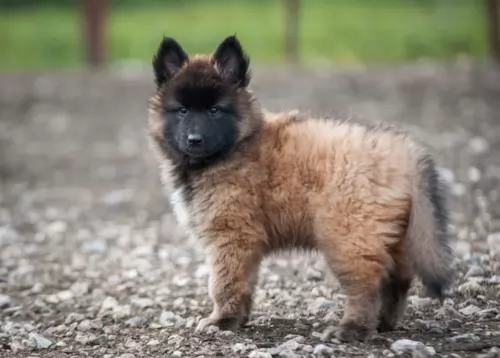 The Tervuren is a medium to large sized, well muscled dog achieving heights of up to 66cm. He has an attractively elegant, regal look to him. The dog has a double coat which is weather resistant. The overall length of the coat which is fawn to mahogany is medium to long and the outer coat is straight with black tips. The males have almost like a mane of hair around the neck that you won’t necessarily find with the females. The tail is long and feathery
The Tervuren is a medium to large sized, well muscled dog achieving heights of up to 66cm. He has an attractively elegant, regal look to him. The dog has a double coat which is weather resistant. The overall length of the coat which is fawn to mahogany is medium to long and the outer coat is straight with black tips. The males have almost like a mane of hair around the neck that you won’t necessarily find with the females. The tail is long and feathery
The Belgian Tervuren is alert and intelligent. His has a long-shaped face with a black mask and upright ears that are sharp and receptive to every sound. He is a herding dog and is full of energy – used to having a job that keeps him busy.
If you don’t want your Tervurens to become destruction, you will need to keep him busy and not just keep him cooped up in the back yard. This particular dog breed is a devoted, loyal pet and forms a strong bond with his human family. However, he will need to be trained and socialized if you want him to behave well around children and pets in the home.
 When reading the AKC standard for the Bernese Mountain Dog you will find that the breed is good natured and self-assured. They are not aggressive, shy or anxious. These are gentle, loving dogs. At the same time, they should be socialized to all kinds of animals, people and children when they are puppies. They are happy outside but need to live in the house with their people. They need exercise and play, and because they are so large, they need this outside. But when it comes to cuddling and sleeping they need to be indoors.
When reading the AKC standard for the Bernese Mountain Dog you will find that the breed is good natured and self-assured. They are not aggressive, shy or anxious. These are gentle, loving dogs. At the same time, they should be socialized to all kinds of animals, people and children when they are puppies. They are happy outside but need to live in the house with their people. They need exercise and play, and because they are so large, they need this outside. But when it comes to cuddling and sleeping they need to be indoors.
They love children though you should be careful with small children because of the Berner’s size and their not being aware of their size at times. They are extremely loyal to their people and want to be with people. They are intelligent, and they want to please their people. At the same time, they are sensitive. They do not respond well to punishment or harshness. They are imposing but they are lovers at heart.
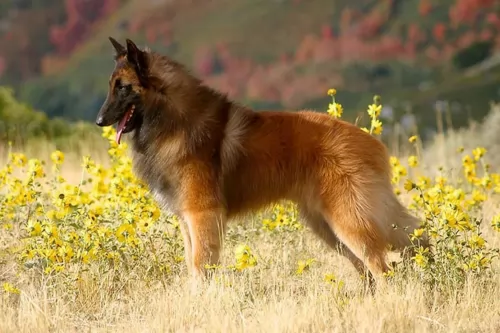 With his beautiful face and lustrous coat, this is a pet that you’re always going to be proud of. Not only that, he is active too, a great watchdog and a fantastic family companion.
With his beautiful face and lustrous coat, this is a pet that you’re always going to be proud of. Not only that, he is active too, a great watchdog and a fantastic family companion.
To keep your Tervuren spritely and contented, ensure he has a high quality diet designed for active herding dogs. He is intelligent too and training and socialization will turn him into an exceptional pet for you. Provide him with lots of human companionship, give him nutritious food and see that any ailments he has are attended to by the vet and you’ll have your attractive pet around with you for up to 12, 13, 14 or 15 years.
 Even though it is well known that cancer is the leading cause of dog deaths across the globe, the Bernese Mountain Dog is particularly prone to die of cancer. Half of all Berners compared with 27% of all dogs, die from cancer. The Berner’s life span is also shorter than most dogs his size. IT is also not just one cancer that attacks the Bernese Mountain Dog but rather at least 6 or more including mast cell, osteosarcoma, malignant histiocytosis, fibrosarcoma, and lymphosarcoma.
They can also suffer from PRA (Progressive Retinal Atrophy), hypoadrenocorticism, cataracts and histiocytic sarcoma. Another issue that plaques the Berner more than other breeds is musculoskeletal issues that cause mortality. This can include issues such as cruciate ligament rupture, arthritis and hip dysplasia. These types of aliments cause death in 6% of the breed while they are usually the cause of mortality in only 2% of all other dogs.
Even though it is well known that cancer is the leading cause of dog deaths across the globe, the Bernese Mountain Dog is particularly prone to die of cancer. Half of all Berners compared with 27% of all dogs, die from cancer. The Berner’s life span is also shorter than most dogs his size. IT is also not just one cancer that attacks the Bernese Mountain Dog but rather at least 6 or more including mast cell, osteosarcoma, malignant histiocytosis, fibrosarcoma, and lymphosarcoma.
They can also suffer from PRA (Progressive Retinal Atrophy), hypoadrenocorticism, cataracts and histiocytic sarcoma. Another issue that plaques the Berner more than other breeds is musculoskeletal issues that cause mortality. This can include issues such as cruciate ligament rupture, arthritis and hip dysplasia. These types of aliments cause death in 6% of the breed while they are usually the cause of mortality in only 2% of all other dogs.
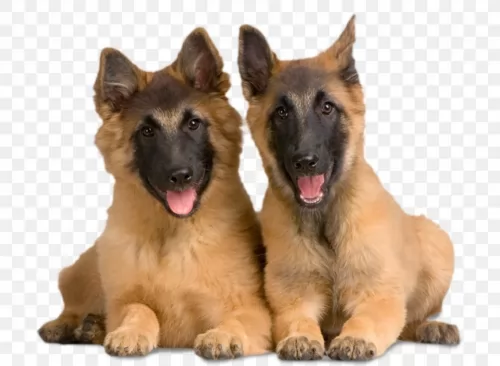 Your Tervuren is a robust, healthy dog breed and with the right food, love and attention, you’re not going to have major health concerns with him. Skin allergies, eye problems and hip dysplasia might be something you want to be aware of.
Your Tervuren is a robust, healthy dog breed and with the right food, love and attention, you’re not going to have major health concerns with him. Skin allergies, eye problems and hip dysplasia might be something you want to be aware of.
A dry, itchy skin with incessant scratching from your pet might require a visit to the vet. If left untreated, an itchy skin and a scratching dog can lead to secondary skin infections and even hair loss. Check for allergies or fleas, and remember that apart from medical management of fleas and ticks, dogs with a dull coat will require a supplement with omega 3 fatty acids.
A common skeletal disorder with malformation of the hip brought on by environmental- and genetic factors. Recognizing the signs of hip dysplasia is important for your dog to help him with pain.
 As with any large purebred dog, the Bernese Mountain Dog needs high quality food that will provide hi with nutrition and keep him from becoming overweight if fed properly. He is however a very large dog with a very large appetite. Watch his calorie intake. It’s ok to use treats if you fit them into the overall calorie intake for the day. Feed him smaller meals twice a day.
As with any large purebred dog, the Bernese Mountain Dog needs high quality food that will provide hi with nutrition and keep him from becoming overweight if fed properly. He is however a very large dog with a very large appetite. Watch his calorie intake. It’s ok to use treats if you fit them into the overall calorie intake for the day. Feed him smaller meals twice a day.
As previously mentioned the breed has quite a few health challenges to deal with, cancer being the number one issue. The small genetic line is one of, if not the main, culprit in this high mortality rate and short life span of the Bernese Mountain Dog. In addition to the conditions mentioned above, they are also susceptible to bloat (stomach inversion). In addition, they face the conditions mentioned previously and should be tested for dysplasia of the hip and elbow, Von Willebrand’s Disease, Cardiac testing and an eye or ophthalmologist exam.
The Bernese Mountain Dog is a gentle giant. They have a calm happy demeanor and they love to work. In fact, they need to work. They love children and will quickly give them cart rides. They compete in carting competitions and herding events sponsored by the AKC. They need exercise but not an extreme amount or intense type. A half-hour a day is enough for them. They love long walks or hiking. They are great companions for backpacking or camping. They are also good at tracking, rally, obedience, and agility.
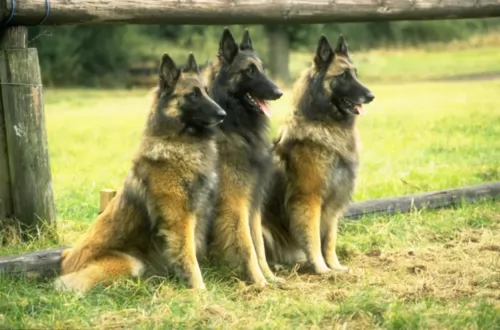 Your Terv is a double-coated dog and he will shed his hair throughout the year. Brushing him at least twice in the week will be necessary to get rid of the hair he sheds. Apart from brushing him and keeping his beautiful coat shiny and healthy, other grooming needs will include clipping his nails and dental hygiene. Brushing his teeth 2 or 3 times a week with specialized dog toothpaste and toothbrush will help with keeping plaque and bacteria at bay.
Your Terv is a double-coated dog and he will shed his hair throughout the year. Brushing him at least twice in the week will be necessary to get rid of the hair he sheds. Apart from brushing him and keeping his beautiful coat shiny and healthy, other grooming needs will include clipping his nails and dental hygiene. Brushing his teeth 2 or 3 times a week with specialized dog toothpaste and toothbrush will help with keeping plaque and bacteria at bay.
Speak to your vet about feeding your Tervuren puppy as he will need at least 4 bowls of food while he is so tiny. By the time he is a year old, he will be able to have 1 or 2 meals a day. Always make sure you feel him high quality food which can be home-made food or commercially manufactured food.
To ensure he doesn’t suffer with any skin allergies, he will need to have some raw meat mixed into his food from time to time. Always provide fresh water for him and make sure to wash the bowls out often.